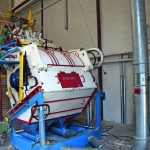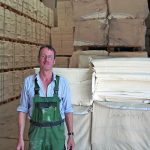Cellulose is a versatile raw material which is used in many industries such as food (for example for dairy products and pasta), technical (for example as a binding agent for mortar and plaster) or animal fodder. Numerous processing steps are necessary to manufacture this all-natural product. Purified fibre extracts, from which the cellulose is dissolved and sub-sequently milled, are utilised as raw material. Homogeneous fibres whose size is exactly matched to the application are an important quality factor.
Uniform wood chips are produced in special crushing mills. The processing steps entail many fire hazards. Fine dust, oxygen and ignition sources in the form of sparks or hot particles are a combination that can easily start a fire.
If foreign bodies like stones or nails get into the high-speed crushing mills, flying sparks are inevitable. Moving system parts such as fans often ignite sparks due to wear. These sparks are transported via the suction system of the mill into downstream systems, for example a preseparator or a filter system, where they could cause a fire or dust explosion. The mill itself is also at risk. If material accumulates, overheating may result.
Extensive safety measures
This is exactly what happened to Jelu, a company in south-west Germany. Founded in 1908 as a grain mill, this family-run firm today manufactures several thousand tons of cellulose for a variety of industries. A victim of several fires in the past, it began equipping all endangered areas with Grecon spark extinguishing systems more than 35 years ago. All mills as well as transport and suction systems are meanwhile monitored for sparks and hot particles, which are extinguished with fine water mist in case of an alarm. “We protect all areas at risk with spark extinguishing systems”, says Hubert Ehrler (Head of Engineering at Jelu) when asked to explain the safety measures in place.
Tailor made protection concept
After the first spark extinguishing system was installed at Jelu back in 1982, the protection concept was continuously expanded over the years. In 2005, all older control stations were modernised with newest-generation spark alarm stations.
If a spark or a hot particle is detected, the part of the system concerned is immediately switched off and automatic extinguishing activated. “The fire hazard has been significantly reduced. Grecon spark extinguishing systems prevent 99 to 99.5% of all fires in production before they have a chance to break out”, Ehrler continues.
The mill itself was likewise equipped with an automatic extinguishing system. Even when the mill is switched off, it carries on running and stirring up dust for up to a minute, presenting a considerable risk in combination with oxygen and the ignition source. Following a short check, the mill is started up again and production can be resumed after only a minimal interruption.
In addition to the highly sensitive FM 1/8 spark detectors for detecting sparks and hot particles in transport lines, Jelu also uses DLD 1/8 detectors, which are insensitive to daylight, to monitor systems with incident daylight. Furthermore, flame detectors monitor whole areas such as the mill building remotely.
“The investment in Grecon spark extinguishing systems has definitely paid off. We are very satisfied with the protection concept, which is specifically tailored to our needs, and in future we also plan to protects other areas like the transport lines to the newly built hall using similar systems”, Ehrler concludes.
Online search: cpp0317grecon
Hall 4, Booth 201









